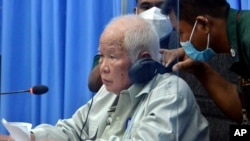The Khmer Rouge Tribunal will hand down its final ruling on Thursday, with its verdict on an appeal filed by the regime’s former head of state Khieu Samphan, who at 91 years old is the last surviving defendant.
Khieu Samphan appealed the 2018 verdict handed down in Case 002/02, in which he was found guilty of crimes against humanity, grave breaches of the Geneva Conventions and genocide of the Vietnamese ethnic minority.
Whatever decision comes down Thursday, the lone surviving leader of the genocidal regime that killed at least 1.7 million people will be facing the same fate — locked in prison for the rest of his life. Khieu Samphan was already handed a life sentence in Case 002/01.
The ruling will close the book on a 15-year collaboration between the Cambodian government and the United Nations that has led to three convictions.
“The tribunal will conclude its legal proceedings on September 22, when it announces its verdict against Khieu Samphan’s appeal,” Neth Pheaktra, the court’s spokesperson, told VOA Khmer.
However, Neth Pheaktra noted that the court will spend a few more years wrapping up its remaining administrative work.
Though Khieu Samphan was cast as a figurehead for the murderous regime led by Pol Pot and his No. 2, Nuon Chea — who died in 2019, after being found guilty alongside Khieu Samphan — the head of state was convicted of a litany of crimes against humanity, including murder, enslavement, torture, forced marriages and rape.
Khieu Samphan was “found to have encouraged, incited, and legitimized criminal policies and to have made a significant contribution to crimes committed” by the Khmer Rouge.
The Extraordinary Chambers in the Courts of Cambodia began proceedings in 2007, with a mandate to try the most senior leaders of the Khmer Rouge. The hybrid nature of the court — including both foreign and Cambodian judges — raised concerns from the start about political influence over who would be put on trial.
Those concerns were bolstered by Prime Minister Hun Sen openly opposing cases beyond Case 002. Ultimately, Cambodia judges blocked trials of less senior leaders, making Case 002 the tribunal’s final chapter, to the dismay of foreign judges, observers and victims’ advocates.
The tribunal handed down its first guilty verdict in Case 001 against Kang Guek Eav, aka Duch, who ran the notorious S-21 prison for the Khmer Rouge. Duch died in September 2020.
The three convictions ultimately cost more than $300 million, with political storms often casting a shadow over the proceedings. However, victim advocates also note how the process has opened the space for discussion of the unbearably dark period between 1975 and 1979.
Craig Etcheson, an academic who headed investigations for the office of the prosecution at the ECCC from 2006 to 2012, said Thursday’s ruling would be most significant for whether the court upholds Khieu Samphan’s conviction for genocide against the Vietnamese.
“That will be important not only for Cambodian history, but also for international jurisprudence, since there have been so few convictions for genocide ever brought against national leaders,” he told VOA Khmer.
Etcheson added that the tribunal would leave a number of important legacies after it shuts down, having made a dramatic contribution to national reconciliation.
“The tribunal successfully attacked the long-standing impunity of the Khmer Rouge for their manifold crimes against humanity,” he said. “The tribunal also successfully individualized guilt for the terror of the Khmer Rouge regime, demonstrating that it was a small cabal of criminal minds that nearly destroyed Khmer civilization.”
Still, many of the civil parties in the case — survivors of the regime who sent testimony to the court more than a decade ago — expected all four senior leaders charged in Case 002 to be convicted when they joined the process, said Leakhena Nou, executive director of the Applied Social Research Institute of Cambodia, which works with dozens of Cambodian-American civil parties.
She said “Khmer Rouge fatigue” has set in, even among those who were excited about the tribunal during its early years.
“It is important for accountability and for historical significance,” she said of this week’s ruling. “But it would be a mistake to conclude that this Court found comprehensive justice for the Cambodian public in terms of healing, reconciliation and closure. That is not the case and will never be the case.”
Leakhena Nou, who is also a sociology professor at California State University, Long Beach, said many of the 174 survivors she helped become civil parties have stopped following the court, or are disappointed that financial reparations are off the table.
However, she said the testimonies they submitted remained on the record, honoring and memorializing their loved ones.
“I think that for that purpose alone, at least with our survivors…they at least feel proud that they did that,” she said.
Youk Chhang, executive director of the Documentation Center of Cambodia, also said the court would leave a legacy beyond its legal rulings.
“There is nothing that can fill that void of losing your families to inhumane crimes of humanity. So, the court alone cannot provide that kind of closure,” Youk Chhang said.
“But what the court does is provide hope and a tool to prevent such crimes from reoccurring. It gives us a benchmark to evaluate how we approach reconciliation.”
Colin Meyn contributed to this report from Washington D.C.









